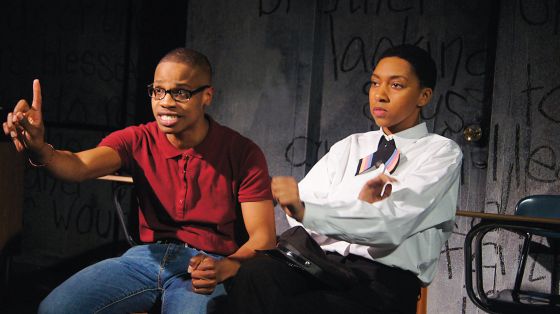
The publicity synopsis may read like a listing for the Hallmark Channel, but playgoers should not be hasty in dismissing Chisa Hutchinson's Surely Goodness and Mercy as simplistic sentimentalism. The belief that optimistic endings are incompatible with intelligent arguments is only one of the popular misconceptions debunked by this prolific author. Our story's hero is 12-year-old Tino, whose mother died, literally, taking a bullet for him—trauma remanding her orphaned son to the reluctant care of his ill-tempered Aunt Alneesa. The sensitive and gifted child finds solace in the Bible (which he reads "cover to cover, like a James Patterson novel" to the scorn of his surly guardian and derisive classmates). At school, his sole allies are self-mutilating fellow student Deja and gruff cafeteria server Bernadette. Their tenuous alliance faces a series of crises when Bernadette is diagnosed with multiple sclerosis and Alneesa orders Tino to steal money raised for medical expenses. Far from meekly acquiescing to bad fortune, though, our trio of misfits discover in themselves hitherto-unrecognized courage, along with the audacity to pursue the resources necessary for each other's deliverance—in fact, not just in spirit—from ignorance and neglect. Let's count the stereotypes refuted by Hutchinson's parable: first, it proposes a teenage male endowed with analytical and intuitive prowess—the latter trait attributed in our culture almost exclusively to girls. Second, it rejects assumptions regarding innate maternal impulses, with both Alneesa and Bernadette defending the wisdom of childlessness for those with neither the skills nor the inclination therefor. Hutchinson also poses a dramatic universe where teachers are often more concerned with classroom discipline than their educative duties, where the purpose of church gospels is not the manufacture of hypocritical bigots and where diseases are not invariably fatal. The snapshot-montage structure of the play (currently making its Rolling World premiere under the auspices of the National New Play Network) renders it particularly well-suited to tiny performance spaces like that of Redtwist. Under the direction of Wardell Julius Clark, an intensely focused cast led by Renee Lockett and Donovan Session resist the temptation to coast on sitcom-cutesy caricature, instead delving their dialogue for grace notes lending warmth and intimacy to personalities too often ignored by adults of superficial values like us.
